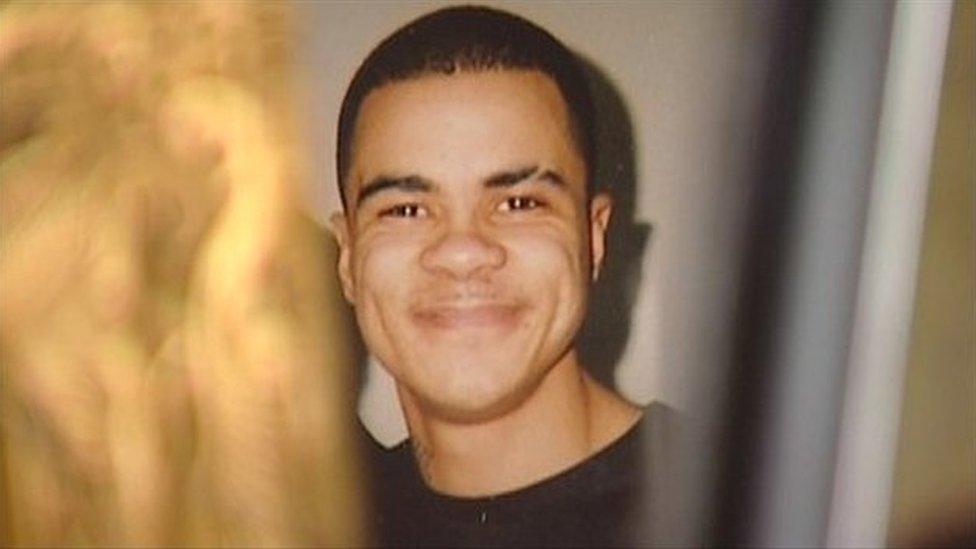Black Lives Matter movement 'needed in UK'
- Published
Amateur video shows Black Lives Matter campaigners trying to obstruct the slip road to Heathrow airport
Activists have voiced hopes that a strong Black Lives Matter movement can be built in Britain following the growth of the campaign in the US.
Organiser Joshua Virasami said black people should come together "to achieve justice and equality in Britain".
The movement has grown over the past three years in protest at police killings of black people in America.
Small-scale protests have been held near Heathrow and in Nottingham on Friday, resulting in some arrests.
Protesters purporting to be part of the Black Lives Matter movement obstructed traffic en route to Heathrow Airport, external, meanwhile in Nottingham some protesters have laid down on tracks in the city centre causing delays to the tram network.
The Met Police said they had attended the scene at Heathrow, and 10 people had been arrested. The aviation policing team later tweeted, external that the last cones were being removed from the M4 spur road, and that the road "should be completely open shortly". Heathrow Airport has apologised for any delays.
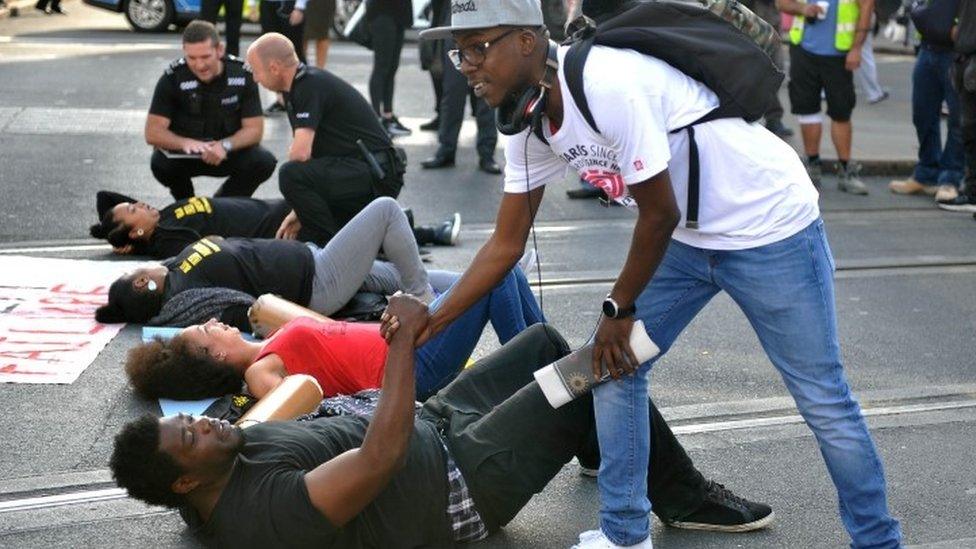
People congratulated some of the protesters in Nottingham who had decided to lie on the tram tracks causing disruption to commuters
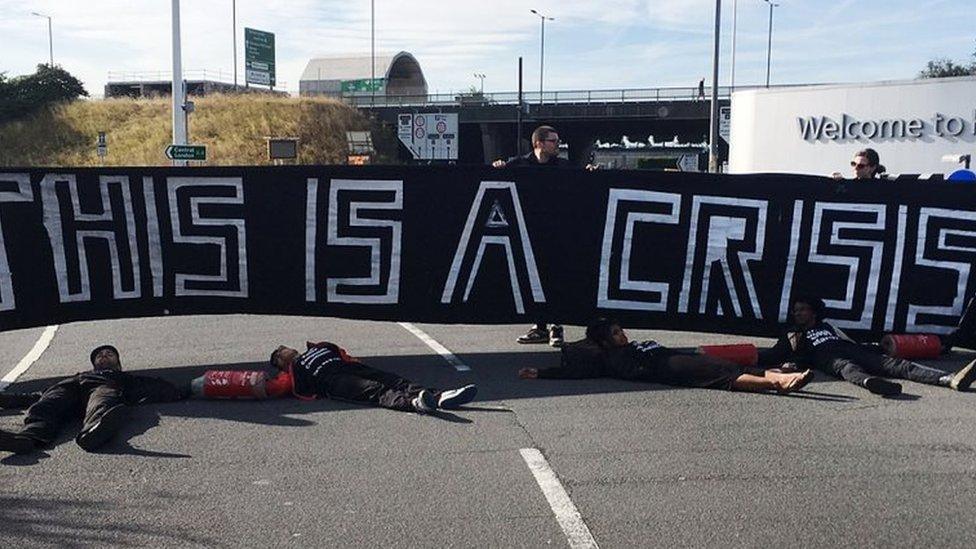
Protesters blocked the road en route to Heathrow and held up a banner which said "This is a crisis"
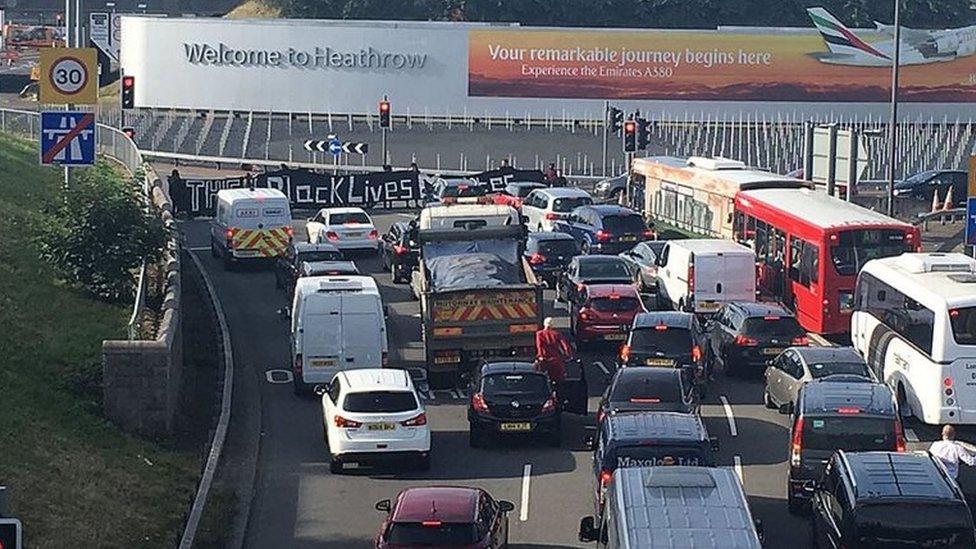
The demonstration caused queues and disruption for motorists
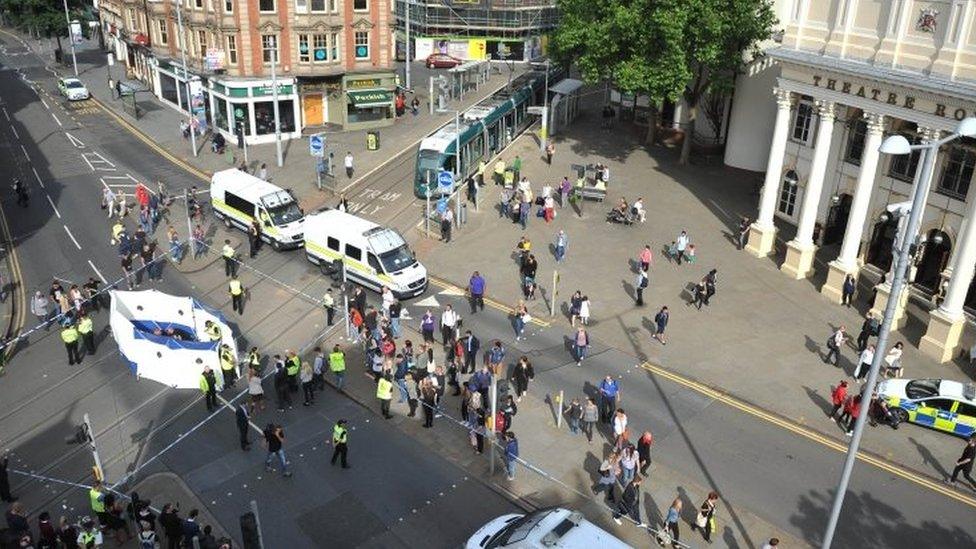
Meanwhile, in Nottingham, police have had to use specialist cutting equipment to separate the protesters whose arms are linked through tubes
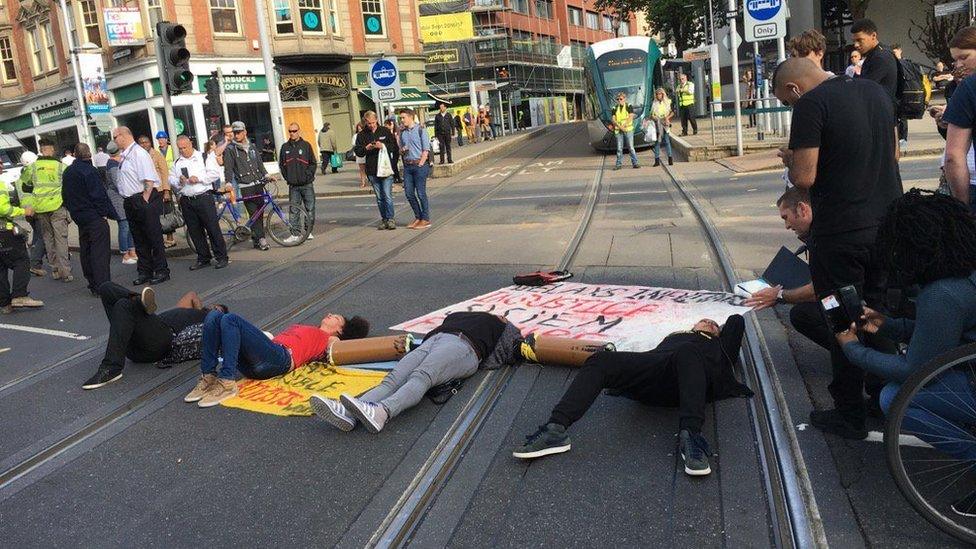
Trams have been delayed in Nottingham as a result of the protest
Black Lives Matter activist Adam Elliott-Cooper, 29, from London, said the Heathrow location was appropriate as "many people are either being killed at our borders or being sent back to certain death".
He made reference to Angolan deportee Jimmy Mubenga, who suffered a fatal heart attack after being restrained on a flight, in October 2010. Three G4S guards were found not guilty of manslaughter in 2014, having denied acting dangerously or negligently during the incident.
The protests come the day after the fifth anniversary of the fatal shooting of Mark Duggan by police in north London, sparking riots which spread to several English cities.
In 2014, an inquest jury concluded that Mr Duggan had been lawfully killed by police, but his family won the right to appeal in October 2015.
Last month hundreds of people marched through central London to the Houses of Parliament in protest at the shooting of two black men by police in the US.
'Achieve justice'
Mr Virasami said: "We need black people all over the world to come together, groups and individuals, to build this movement to achieve justice and equality in Britain and all over the world.
"We're asking the government to take responsibility, not just to investigate the statistics but to hear the demands of the communities."
Dr Tony Sewell, from the Youth Justice Board, told BBC Radio 4's Today programme that in England and Wales 21% of young men under 18 in custody were black - though black people only made up 4% of the general population.
Conversely, he said, 60% of men under 18 in custody were white, when that racial group made up 82% of the population.
"That is a scandal, that's what we should really be looking at," he said.
Kadija Sesay - who is the cousin of Sheku Bayoh, 31, who died after being arrested and restrained in Kirkcaldy in May 2015 - said more needed to be done.
"People need to realise that this happens in the UK all of the time, in state institutions - it happens," she told the BBC's Victoria Derbyshire programme.
Toyin Agbetu, who is a British-African social rights activist, told the programme that since the Brexit vote there had been "increased racism" within the UK, and said the problem was "more hidden" compared with the US.
He added that the UK's Black Lives Matter movement was saying "treat us with dignity", and he described deaths after police restraints as a "normalised form of terrorism" that black people faced.
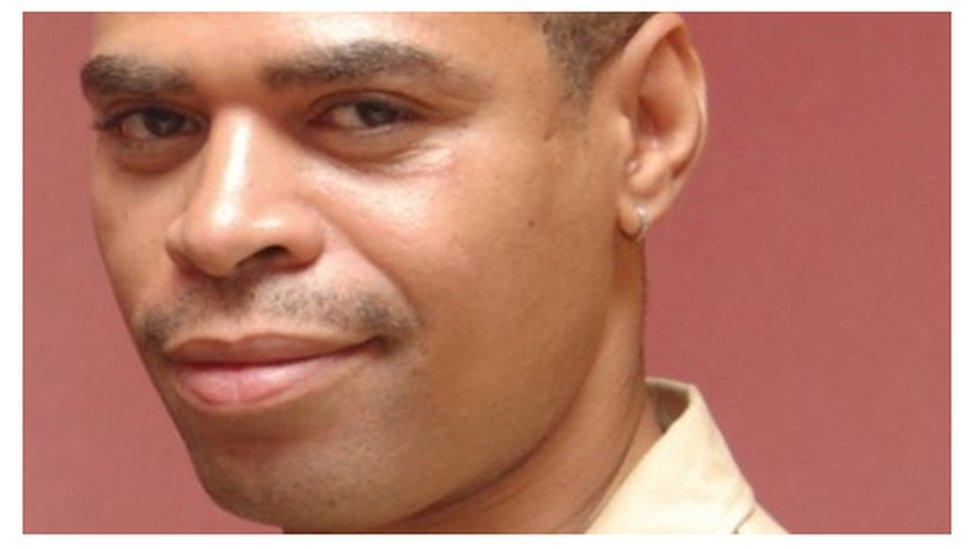
Sean Rigg died from cardiac arrest at Brixton police station in 2008
Activist Marcia Rigg said: "It's absolutely vital that there is a platform for the families in the UK and BLM [Black Lives Matter] is perfect for that."
Her brother Sean Rigg, who suffered from schizophrenia, died at Brixton police station in 2008.
An IPCC investigation identified no police misconduct but in 2012 an inquest jury found that police had used "unsuitable" force after arresting Mr Rigg.
Five police officers could face criminal charges following the death of Mr Rigg while in police custody.
"Families like mine have been suffering for a long time and there has been an injustice," Ms Rigg said.
"Deaths are not just happening in the US at the hands of police; they are happening in the UK too, and so therefore it's the perfect platform to highlight those deaths in Britain because people are not aware of them."
Cdr Mak Chishty, National Police Chiefs' Council lead for Race and Religion, told the BBC: "I know that cases like Sean Rigg are infrequent and few and far between, but that doesn't mean they're any less important to us.
"Cases like that are extremely important - we want to learn, we want to improve and we want to give confidence back to the whole of our communities."
In recent weeks in the US, two white officers in Baton Rouge, Louisiana, killed a black man during an incident and an officer in Minnesota shot and killed a black motorist during a traffic stop, sparking protests.
- Published15 October 2015
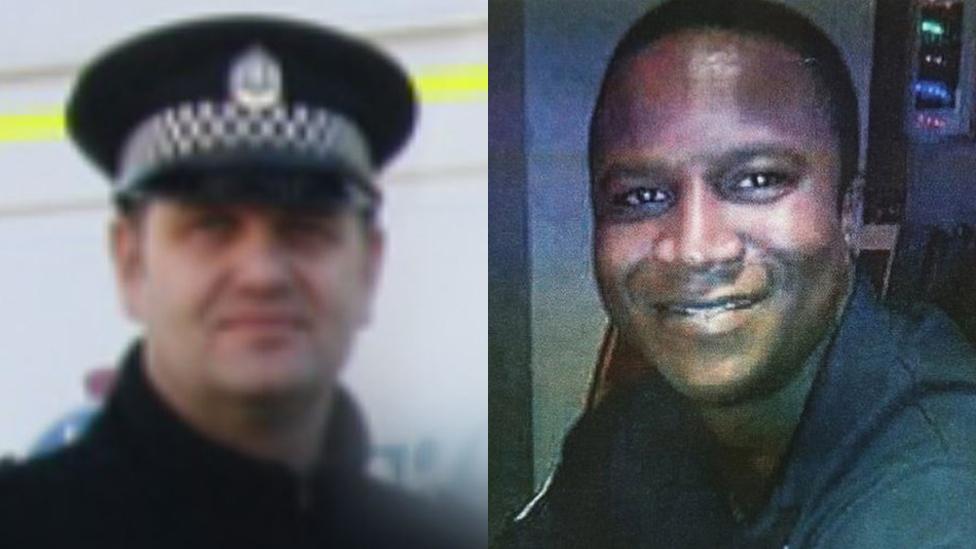
- Published8 July 2016
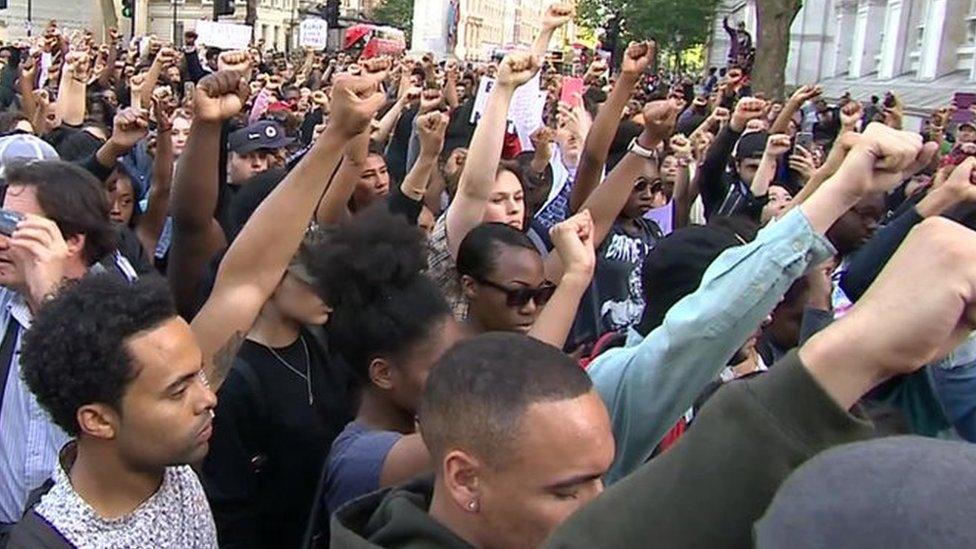
- Published8 July 2016
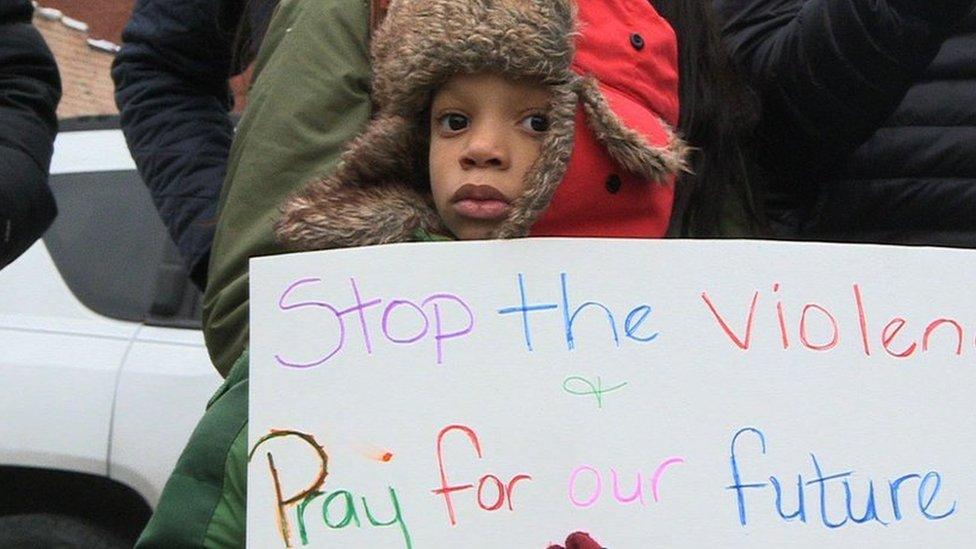
- Published1 March 2016
- Published27 October 2015
